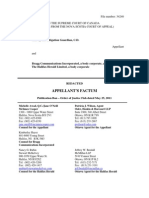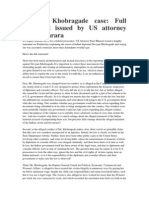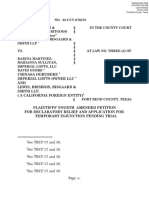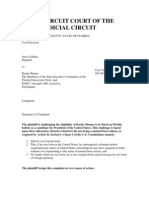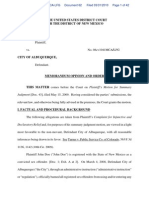Complaint
Complaint
Uploaded by
jimchase666Copyright:
Available Formats
Complaint
Complaint
Uploaded by
jimchase666Original Description:
Copyright
Available Formats
Share this document
Did you find this document useful?
Is this content inappropriate?
Copyright:
Available Formats
Complaint
Complaint
Uploaded by
jimchase666Copyright:
Available Formats
IN THE UNITED STATES DISTRICT COURT FOR THE SOUTHERN DISTRICT OF INDIANA
Jeffrey E. Howell, Plaintiff RELIEF v.
) ) ) ) ) ) ) ) ) ) ) ) ) ) ) ) ) ) ) ) ) )
COMPLAINT FOR 1) DECLARATORY AND INJUNCTIVE 2) GENERAL, COMPENSATORY AND PUNITIVE DAMAGES 3) PLAINTIFFS COSTS
State of Indiana, Greg Zoeller, Indiana Department of Correction, Keith Butts, City of Indianapolis, Darin Odier, Shani Anderson, Michael Thayer, Clark County, Indiana, Daniel Rodden, Liberty Behavorial Health, Benjamin James, Cary Rezman, Kelly Hoffman, Defendants
CIVIL ACTION NO.__________________
JURY TRIAL DEMANDED
JURISDICTION AND VENUE 1. This action arises under Article III of the U.S. Constitution and laws of the United States. Jurisdiction is conferred on this Court pursuant to 28 U.S.C. 1331 and 1343. 2. Plaintiffs claims for declaratory and injunctive relief are authorized by 28 U.S.C. 2201, et seq; by Rules 57 and 65 of the Federal Rules of Civil Procedure, and by the general legal and equitable powers of this Court.
3. Venue is proper under 28 U.S.C. 1391(b)(1) and (2) because a substantial part of the events or omissions giving rise to the claims occurred in this judicial district and because this is the judicial district in which the Plaintiff resides. 4. The Court has the authority to award costs and attorneys fees under 28 U.S.C. 2412. PLAINTIFF 5. Plaintiff, Jeffrey E. Howell, is an adult individual who resides at 620 South Walnut Street, Bloomington, Indiana 47401. DEFENDANTS 6. Defendant, State of Indiana, is a state of the United States that entered the Union as the 19th state on December 11, 1816; c/o: Indiana Attorney General, 302 W. Washington Street, Fifth Floor, Indianapolis, Indiana 46204. 7. Defendant, Greg Zoeller, is sued in his official capacity as Attorney General of the State of Indiana; 302 W. Washington Street, Fifth Floor, Indianapolis, Indiana 46204. 8. Indiana Department of Correction, 302 W. Washington Street, Room E334, Indianapolis, Indianapolis 46204. 9. Keith Butts, in his individual and official capacity as superintendant of the New Castle Correctional Facility, 1000 Van Nuys Road, P.O. Box E, New Castle, Indiana 47362.
10. Defendant, City of Indianapolis, Indiana, is a consolidated city/county government; c/o Office of Corporation Counsel, 200 E. Washington Street, Room 1601, Indianapolis, Indiana 46204.
11. Defendant, Darin Odier, is sued in his individual and official capacity as a police officer for the City of Indianapolis; c/o Office of Corporation Counsel, 200 E. Washington Street, Room 1601, Indianapolis, Indiana 46204. 12. Defendant, Shani Anderson, is sued in her individual and official capacity as a police officer for the City of Indianapolis; c/o Office of Corporation Counsel, 200 E. Washington Street, Room 1601, Indianapolis, Indiana 46204. 13. Defendant, Michael Thayer, is sued in his individual and official capacity as a supervising police officer for the City of Indianapolis, c/o Office of Corporation Counsel, 200 E. Washington Street, Room 1601, Indianapolis, Indiana 46204. 14. Defendant, Clark County, Indiana, is a governmental entity within the State of Indiana, 501 E. Court Avenue, Room 404, Jeffersonville, Indiana 47130. 15. Defendant, Daniel Rodden, is sued in his individual and official capacity as sheriff of Clark County, Indiana; 501 E. Court Avenue, Suite 159, Jeffersonville, Indiana 47130. 16. Liberty Behavioral Health, in its official capacity as the contracted provider for sex offender counseling to the State of Indiana, 440 N. Meridian Street, Indianapolis, Indiana 46204. 17. Benjamin James, in his individual and official capacity as sex offender counselor for the Indiana Department of Correction, c/o: New Castle Correctional Facility, 1000 Van Nuys Road, P.O. Box E, New Castle, Indiana 47362. 18. Cary Rezman, in her individual and official capacity as clinical program coordinator for the sex offender management and monitoring program of the Indiana Department of Correction, c/o: New Castle Correctional Facility, 1000 Van Nuys Road, P.O. Box E, New Castle, Indiana 47362.
19. Kelly Hoffman, in her individual and official capacity as clinical program director for the sex offender management and monitoring program of the Indiana Department of Correction, c/o: New Castle Correctional Facility, 1000 Van Nuys Road, P.O. Box E, New Castle, Indiana 47362. STATEMENT OF THE FACTS 20. Plaintiff incorporates herein by reference all of the averments of all previous paragraphs with like force and effect as though set forth in full herein. 21. In 2008, Plaintiff was arrested for allegedly violating Indiana Code 35-42-4-6 after engaging in a conversation with Defendant Darin Odier, in an Internet chat room restricted to adults. At no time did Plaintiff believe he was communicating with a minor, and state courts refuse to consider evidence supporting Plaintiffs actual innocence. 22. Plaintiffs conviction was secured by Defendant Odiers false testimony and Deputy Prosecutor Mary Hutchinsons subornation of Odiers false testimony, as will be proven by Plaintiff. 23. Indiana Code 35-42-4-6 is unconstitutionally vague and overbroad as it allows for the discriminatory and arbitrary enforcement by law enforcement, does not allow for mistake of fact, even though the conversation takes place in a venue that is restricted to adults and where it is not reasonable to believe that minors would be present, and that does not present an immediacy requirement, in violation of the U.S. Constitution. 24. When Plaintiff was arrested in October 2010 for violation of probation, various items, including digital storage devices, were seized from Plaintiff. The Court involved refuses to return the items to Plaintiff because images were found on some of the devices that the Court considers illegal even though none of the images have been proven to be illegal, and
Plaintiff contends they are not illegal. Plaintiff contends that Indiana Code 35-42-4-4 is unconstitutionally vague and overbroad because it allows for the discriminatory and arbitrary enforcement by law enforcement and prosecutors, because images only need appear to be child pornography and the State of Indiana claims that it is not required to prove that the individuals appearing in the images are under the proscribed age. COUNT I INDIANA CODE 35-42-4-4 IS UNCONSTITUTIONALLY VAGUE AND OVERBROAD 25. Plaintiff incorporates herein by reference all of the averments of all previous paragraphs with like force and effect as though set forth in full herein. 26. Indiana Code 35-42-4-4 criminalizes the possession of images that appear to be child pornography, even though the individuals appearing in the images are not minors. 27. The State of Indiana claims that it is not required to prove the individuals appearing in such images to be minors. 28. Such discriminatory and arbitrary enforcement leads to the arrest, prosecution and conviction of individuals who are not in possession of child pornography. COUNT II INDIANA CODE 35-42-4-6 IS UNCONSTITUTIONALLY VAGUE AND OVERBROAD 29. Plaintiff incorporates herein by reference all of the averments of all previous paragraphs with like force and effect as though set forth in full herein. 30. There have been a number of attempts by the government to regulate speech on the Internet, under the guise of protecting children. In each case, the statutes were ruled unconstitutional, overbroad, and vague, in part because it is not possible to know whether an
Internet user is an adult or a minor. Like the Indiana statute, inclusion of a specific person requirement failed to save the statutes. 31. Similarly, a law that made it a crime to manufacture, possess, or distribute, virtual child pornography, was struck down because no actual minors were being used in the material, and thus created no victims. 32. Indiana Code 35-42-4-6, as it applies to the Internet, allows for arbitrary and indiscriminate enforcement, in that it is not possible to know for certain how old an individual [on the Internet] is. As in Plaintiffs case, an individual may find himself being prosecuted and convicted for conducting adult-related activities in an environment known to be restricted to adults through age verification using gateway technology. 33. Indiana Code 35-42-4-6, as it applies to the Internet, allows for arbitrary and indiscriminate enforcement, in that it is not possible to know for certain how old an individual [on the Internet] is. As in Plaintiffs case, an individual may find himself being prosecuted and convicted for conducting adult-related activities in an environment known to be restricted to adults through age verification using gateway technology. 34. Indiana Code 35-42-4-6 also makes it a more serious crime to solicit a minor over the Internet than it does soliciting a minor in person. In other words, an actual predator who goes to a playground, a mall, a park, or other location where actual children would be found, and who solicits an actual child, in person, could be convicted of a D felony; if an individual, however, solicits a minor (a minor that may even be fictitious) in the relatively safe confines of the Internet, could be convicted of a C felony. 35. Media reports have overblown the problem of Internet predation. Survey results regarding Internet child solicitations have been misinterpreted by the media and by law
enforcement, which has resulted in a moral- or techno-panic. For example, NBC Datelines To Catch a Predator has sensationalized and inflated the problem of Internet predation. 36. The sources of the surveys have made attempts to clarify the survey results, showing there is not a problem, however, the media and law enforcement have continued to misquote and misuse these survey results in an effort to sensationalize and inflate the problem of Internet predation. 37. In response to the sensationalized and inflated problem of Internet predation propagated by the media and law enforcement, the Indiana General Assembly amended Indiana Code 35-42-4-6, as it applies to the Internet, by removing a mistake of fact defense, an immediacy requirement, and any affirmative defense as to the venue where the alleged solicitation took place (in Plaintiffs case, a chat room age-restricted to adults). 38. On February 9, 2009, Plaintiff was convicted of child solicitation. On February 27, 2009, Plaintiff was sentenced to a total of four years. 39. As a result of his conviction, Plaintiff is required to register as a sex offender for ten years, even though there was no victim and no child was harmed. 40. The defendants violated Plaintiffs rights under the First, Fourth, Fifth, Sixth, Ninth, and Fourteenth Amendments of the U.S. Constitution, causing Plaintiff irreparable and continuing injury. 41. The conduct of defendants has been sufficiently outrageous so as to entitle Plaintiff to general, compensatory and punitive damages. Punitive damages are appropriate to deter defendants future outrageous conduct. COUNT III CONSPIRACY TO VIOLATE PLAINTIFFS CIVIL AND CONSTITUTIONAL RIGHTS AND OUTRAGEOUS GOVERNMENT CONDUCT
42. Plaintiff incorporates herein by reference all of the averments of all previous paragraphs with like force and effect as though set forth in full herein. 43. Upon information and belief, Defendants Darin Odier, Shani Anderson, and Michael Thayer, conspired to violate Plaintiffs civil and constitutional rights, by engaging in an Internet decoy operation premised on an unconstitutional statute. 44. Upon information and belief, on or about April 30, 2008, Defendants, Odier and Anderson, began an online investigation of child solicitation. Odier claims to have "[ . .. ]set up a Yahoo account using the screen name 'indydiamondgirl08' and creating a profile indicating that he was a fourteen-year old girl named Ashley." 45. The State provided no evidence of such a profile during the trial. While Odier presumably did create a profile, it was clearly an adult's profile, otherwise he would not have had access to Yahoo's chat rooms. Furthermore, the profile did not "indicate" that it represented a person of any specific age. 46. Upon information and belief, Defendant Anderson and Thayer were present when Odier engaged in the conversation with Plaintiff. Both Andersons and Thayers names appear as a witness on the application for search warrant. 47. Upon information and belief, Defendant Thayer is a Sergeant in the detective division of the Indianapolis Metropolitan Police Department, and supervised Defendants Odier and Anderson. Thayer was thus in a position to prevent the deprivation of Plaintiffs civil and constitutional rights by Odier and Anderson. 48. Upon information and belief, Defendants Odier, Anderson and Thayers deprivation of Plaintiffs civil and constitutional rights rise to the level of outrageous government conduct.
49. Outrageous conduct is premised upon the notion that the due process clause imposes limits upon how far the government can go in detecting crime irrespective of the character of the target. 50. Upon information and belief, Defendants Odier, Anderson and Thayers misconduct was of such a nature that it violated Plaintiffs rights of fundamental fairness, shocking to the universal sense of justice, which is mandated by the Due Process Clause of the Fifth Amendment. 51. When the Government's quest for convictions leads to the apprehension of an otherwise law-abiding citizen who, if left to his own devices, likely would have never run afoul of the law, the courts should intervene. 52. The conduct of defendants has been sufficiently outrageous so as to entitle Plaintiff to general, compensatory and punitive damages. Punitive damages are appropriate to deter defendants future outrageous conduct. COUNT IV DEFAMATION 53. Plaintiff incorporates herein by reference all of the averments of all previous paragraphs with like force and effect as though set forth in full herein. 54. Plaintiff was arrested on June 30, 2008. On July 4, 2008, an article appeared in Plaintiffs hometown newspapers, the Jeffersonville Evening News and New Albany Tribune, in which Defendant Rodden reported that Plaintiff had been arrested because child pornography had been found on his computer. 55. Upon information and belief, Defendant Rodden defamed Plaintiffs reputation and character by providing false information to the news media. As an experienced police officer,
with several years as a detective, Defendant Rodden would have known that the Plaintiffs computer would not have been examined in the four days subsequent to his arrest. Thus, Defendant Rodden would not have known what, if anything, was on Plaintiffs computer when he made the statement to the media. 56. Upon information and belief, Defendant Rodden conducted no investigation into the veracity of the defamatory statements before releasing them to the media. 57. Upon information and belief, Defendant Roddens defamatory statements were made intentionally and without concern for whether the statements were true. The false statements have harmed the Plaintiff. 58. Upon information and belief, Defendant Roddens defamatory statements were made intentionally or with reckless disregard to the truth or veracity of his statements. Defendant Rodden knew his statements would harm the Plaintiff. 59. Upon information and belief, Defendant Roddens defamatory statements were made publicly and were intended to be made public. 60. The conduct of Defendant Rodden has been sufficiently outrageous so as to entitle Plaintiff to general, compensatory and punitive damages. Punitive damages are appropriate to deter defendants future outrageous conduct. COUNT V WRONGFUL TERMINATION AND DENIAL OF UNEMPLOYMENT BENEFITS 61. Plaintiff incorporates herein by reference all of the averments of all previous paragraphs with like force and effect as though set forth in full herein. 62. Upon Plaintiffs arrest on June 30, 2008, Defendant Rodden, in his individual and official capacity and as a representative of Defendant Clark County, Indiana, sent two representatives to
Plaintiffs residence to collect Plaintiffs uniforms, credentials, and other items (including items purchased by Plaintiff and for which he has never been reimbursed) pertaining to his employment with the Clark County Sheriffs Office. 63. Upon information and belief, Plaintiff understood the action taken in 62, supra, to be a termination of his employment 64. Upon information and belief, one or more announcement(s) was/were made to employees of the Clark County Sheriffs Office, to the effect that Plaintiff was no longer employed there and that Plaintiff was no longer permitted on the property. 65. Upon information and belief, Plaintiff understood the action taken in 64, supra, to be yet another indication of termination of his employment. 66. Subsequent to Plaintiffs release from jail on July 17, 2008, Plaintiff applied for unemployment compensation benefits with the Indiana Department of Workforce Development, based on his bona fide belief that he had been terminated from employment with the Clark County Sheriffs Office. 67. Subsequent to Plaintiffs application for unemployment compensation benefits, Plaintiff received notice that his former employer, Clark County, was challenging his application, claiming that Plaintiff had voluntarily resigned rather than having been terminated. 68. Plaintiff countered his former employers claim and requested and was granted a determination hearing with an Administrative Law Judge. 69. During the telephonic hearing, held on September 30, 2008, a representative of Plaintiffs former employer testified that Plaintiff had voluntarily resigned as defined by sheriffs office
police, which states Any employee who fails to report for work by the end of their shift on the fourth working day after the leave expires shall be considered to have voluntarily resigned.1 70. The fourth day as it would have applied to Plaintiff would have been July 5, 2008. Plaintiff normally worked, and was scheduled to work, the 2:00 PM to 10:00 PM shift, thus, the deadline as defined by the cited policy would have been 10:00 PM on July 5, 2008. 71. In a newspaper article regarding Plaintiff, which appeared in the Jeffersonville Evening News and New Albany Tribune on July 4, 2008, Defendant Rodden is quoted as saying, He no longer works here to say the least. 72. Upon information and belief, Defendant Rodden intended Plaintiffs employment to be terminated effective June 30, 2008, otherwise, how would he have known on the third day that Plaintiff was voluntarily resigning as of the end of his shift on the requisite fourth day? 73. Plaintiff contends that he was also wrongfully terminated prior to any finding of guilt in his criminal matter. According to sheriffs office police, and employee who is off duty, not in uniform and arrested, would be subjected to a suspension of 3-15 days for a first offense, 515 days for a second offense, and 16 days-termination for a third offense. 74. Upon information and belief, and based upon these actions, and the deceptive actions of Defendant Rodden, Plaintiff was denied unemployment compensation benefits that were legitimately due. 75. The conduct of Defendant Rodden has been sufficiently outrageous so as to entitle Plaintiff to general, compensatory and punitive damages. Punitive damages are appropriate to deter defendants future outrageous conduct.
COUNT VI VIOLATION OF PLAINTIFFS RIGHTS UNDER THE FIFTH AND FOURTEENTH AMENDMENT OF THE U.S. CONSTITUTION 76. Plaintiff incorporates herein by reference all of the averments of all previous paragraphs with like force and effect as though set forth in full herein. 77. One of the requirements for Plaintiff to serve his sentence on the child solicitation conviction was for Plaintiff to successfully participate in and complete Indianas Sex Offender Management and Monitoring (SOMM) program. 78. Requirements for successful participation and completion of the SOMM program include admitting guilt for the alleged offense for which Plaintiff was convicted. 79. Plaintiff was found guilty by jury trial and has maintained his actual innocence on the child solicitation charge. 80. Plaintiff agreed to participate in the SOMM program, with the admonition that he was invoking his rights under the Fifth Amendment, in that he would not discuss the details of the case that lead to his arrest and conviction. 81. On one occasion, when meeting with Defendants James and Rezman, Plaintiff emphasized his right to invoke the Fifth Amendment in connection with the SOMM program, to which Rezman replied but there are consequences. 82. Defendants State of Indiana, Indiana Department of Conviction, Superintendent Keith Butts, Liberty Behavioral Health, SOMM Counselor Benjamin James, Cary Rezman and Dr. Kelly Hoffman, all violated Plaintiffs Constitutional rights under the Fifth and Fourteenth Amendment by disciplining him when he refused to discuss the details of his alleged crime.
83. Plaintiff was placed in segregation, demoted in credit class, lost credit time, and lost phone, commissary and visitation privileges, as a result of the invocation of his Fifth Amendment rights. 84. On October 31, 2013, the Indiana Court of Appeals reversed a lower Courts denial of Plaintiffs Motion for Restoration of Credit Time and Class, and ordered the lower Court to issue an order granting said motion and to issue an injunction preventing the Indiana Department of Correction from requiring Plaintiff to make incriminating statements as a part of the SOMM program. CONCLUSION 85. Plaintiff incorporates herein by reference all of the averments of all previous paragraphs with like force and effect as though set forth in full herein. 86. As a direct and proximate cause of defendants intentional and willful violations of Plaintiffs rights, Plaintiff has suffered an adverse effect in the form of direct and indirect injury to Plaintiffs reputation, extreme public embarrassment, humiliation, anxiety, ridicule, emotional distress, mental anguish, physical pain and suffering, trauma, past, present and future loss of income, and damage to career progression and professional reputation. Plaintiff has also been subjected to substantial harm, embarrassment, inconvenience, and unfairness as a result of the violations committed by defendants. 87. The defendants interest in creating news was far more important than Plaintiffs right to justice. 88. The defendants actions were designed to cast Plaintiff in the most suspicious and negative light possible.
89. The defendants assertions represent unbridled exaggeration. The result is not a measured judgment of risk, but incitement of apprehension, even paranoia, that can override fairness and justice. 90. The physical and emotional damage to Plaintiff is ongoing and directly caused by the defendants actions. 91. Upon information and belief, the conduct of the defendants has been sufficiently outrageous as to entitle Plaintiff to an award of punitive damages. 92. The Plaintiff has no plain, adequate or complete remedy at law to redress the wrongs described herein. 93. Plaintiff, as well as others not before the Court, have been and will continue to be irreparably injured by the conduct of the defendants unless this Court grants the declaratory and injunctive relief which Plaintiff seeks. PRAYER FOR RELIEF WHEREFORE, Plaintiff respectfully prays that this Court enters judgment granting Plaintiff: 94. A declaration that the acts and omissions described herein violated Plaintiffs rights under the Constitution and laws of the United States. 95. A preliminary and permanent injunction ordering defendants to cease enforcement of Indiana Code 35-42-4-4, until such time as the Indiana General Assembly amends the statute to remove the appears to be provision, and to require the State of Indiana to bear the burden of proof that individuals appearing in questionable images are actually minors before classifying those images as child pornography. 96. A preliminary and permanent injunction ordering defendants to cease enforcement of Indiana Code 35-42-4-6, as it pertains to the Internet, until such time as the Indiana General
Assembly amends the statute to allow a mistake of fact defense, and to replace the immediacy requirement, as well as a prohibition on the enforcement of the statute in Internet venues that utilize gateway technology to restrict access to adults. 97. An order that addresses the lack of equality of soliciting a child in person (D felony) versus soliciting a child via the Internet (C felony) (or B felony with a prior unrelated conviction). 98. A preliminary and permanent injunction ordering defendants to cease classifying an individual convicted of violating Indiana Code 35-42-4-6, as a sex offender and as an offender against children, when there was no actual child involved. 99. An award of general damages for the defendants wrongful acts in the amount of $500,000 against each defendant. 100. defendant. 101. Punitive damages for the defendants reprehensible and outrageous conduct in the An award of compensatory damages in the amount of $500,000 against each
amount of $1,000,000 against each defendant. 102. 103. 104. A jury trial on all issues triable by jury. Plaintiffs costs in this action, as permitted by 28 U.S.C. 2412. Any additional relief this Court deems just, proper, and equitable. Respectfully Submitted,
Dated: ___________________
_____________________________ Jeffrey E. Howell, Plaintiff, pro se
VERIFICATION I have read the foregoing complaint and hereby verify that the matters alleged therein are true, except as to matters alleged on information and belief, and, as to those, I believe them to be true. I certify under penalty of perjury that the foregoing is true and correct, to the best of my knowledge and belief.
Executed at Bloomington, Indiana, on_____________________.
______________________________ Plaintiff, pro se Jeffrey E. Howell 620 S. Walnut Street Bloomington IN 47401-4624 (812) 334-5728
You might also like
- DCFS and Your RightsDocument26 pagesDCFS and Your Rightscashprize100% (49)
- Motion To RecuseDocument12 pagesMotion To RecuseDianna Elliott75% (4)
- Motions, Affidavits, Answers, and Commercial Liens - The Book of Effective Sample DocumentsFrom EverandMotions, Affidavits, Answers, and Commercial Liens - The Book of Effective Sample DocumentsRating: 4.5 out of 5 stars4.5/5 (17)
- Motion For Preliminary InjunctionDocument24 pagesMotion For Preliminary Injunctionjimchase666No ratings yet
- Motion For Preliminary InjunctionDocument24 pagesMotion For Preliminary Injunctionjimchase666No ratings yet
- Sample Motion to Vacate, Motion to Dismiss, Affidavits, Notice of Objection, and Notice of Intent to File ClaimFrom EverandSample Motion to Vacate, Motion to Dismiss, Affidavits, Notice of Objection, and Notice of Intent to File ClaimRating: 5 out of 5 stars5/5 (23)
- Barangay Certificate of IndigencyDocument5 pagesBarangay Certificate of IndigencyNoe S. Elizaga Jr.100% (1)
- Jeremiah Harris - Criminal Complaint.Document28 pagesJeremiah Harris - Criminal Complaint.Law&CrimeNo ratings yet
- Appl-2. Community Hall Booking FormDocument2 pagesAppl-2. Community Hall Booking Formsandeep kumar sahooNo ratings yet
- Tax Reviewer 3 TRANSFER TAXDocument6 pagesTax Reviewer 3 TRANSFER TAXAlliahDataNo ratings yet
- Protectthe Identityreputation and Egrity OfindividaDocument22 pagesProtectthe Identityreputation and Egrity OfindividaPs GamersNo ratings yet
- AG Todd Rokita Legal DocumentsDocument56 pagesAG Todd Rokita Legal DocumentsThe FederalistNo ratings yet
- Petitioner Vs Vs Respondents Rodolfo P. Orticio The Solicitor GeneralDocument15 pagesPetitioner Vs Vs Respondents Rodolfo P. Orticio The Solicitor GeneralMaureen AntallanNo ratings yet
- Defendants' Answer To Complaint For Declaratory and Injunctive ReliefDocument36 pagesDefendants' Answer To Complaint For Declaratory and Injunctive ReliefEquality Case FilesNo ratings yet
- The Reid Interrogation Technique and False Confessions - A Time For Change May 14 2017Document43 pagesThe Reid Interrogation Technique and False Confessions - A Time For Change May 14 2017amydaniels99No ratings yet
- JWG LLM IEG V 4 4.6.2016 Final 1 Amend Federal Verifyed Complaint Feb 17, 2014Document44 pagesJWG LLM IEG V 4 4.6.2016 Final 1 Amend Federal Verifyed Complaint Feb 17, 2014mikekvolpeNo ratings yet
- Christian Cadajas y Cabias vs. People of The PhilippinesDocument2 pagesChristian Cadajas y Cabias vs. People of The PhilippinesKlyza Zyra KateNo ratings yet
- United States Court of Appeals: PublishedDocument15 pagesUnited States Court of Appeals: PublishedScribd Government DocsNo ratings yet
- IdkDocument48 pagesIdkMike WilliamsNo ratings yet
- Equality Utah, Et Al, Pseudonyms OrderDocument3 pagesEquality Utah, Et Al, Pseudonyms OrderBen WinslowNo ratings yet
- Wall of Moms, Et Al. v. DHS, Et Al.Document48 pagesWall of Moms, Et Al. v. DHS, Et Al.Law&CrimeNo ratings yet
- Emergency Motion ResponseDocument17 pagesEmergency Motion ResponseUSWGO Brian D. HillNo ratings yet
- In The United States District Court District of KansasDocument31 pagesIn The United States District Court District of KansasAG HaleNo ratings yet
- Appellant's Factum, A.B. v. BraggDocument47 pagesAppellant's Factum, A.B. v. BraggDrew HasselbackNo ratings yet
- David Levell W., A Minor v. State of California, 449 U.S. 1043 (1980)Document7 pagesDavid Levell W., A Minor v. State of California, 449 U.S. 1043 (1980)Scribd Government DocsNo ratings yet
- Analysis of Alleged Fraud in Briefs Supporting Crawford RespondentsDocument75 pagesAnalysis of Alleged Fraud in Briefs Supporting Crawford RespondentsJamie SandersonNo ratings yet
- FOR PUBLICATION UNITED STATES COURT OF APPEALSFOR THE NINTH CIRCUIT N IMENISH P ATEL, v. F ACEBOOK, INC ., No. 18-15982 D.C. No.18-15982-2019-08-08-3Document24 pagesFOR PUBLICATION UNITED STATES COURT OF APPEALSFOR THE NINTH CIRCUIT N IMENISH P ATEL, v. F ACEBOOK, INC ., No. 18-15982 D.C. No.18-15982-2019-08-08-3Jenny B.No ratings yet
- Brian Kosanovich ArrestDocument19 pagesBrian Kosanovich ArrestWSETNo ratings yet
- United States Court of Appeals, Third CircuitDocument20 pagesUnited States Court of Appeals, Third CircuitScribd Government DocsNo ratings yet
- G.R. No. 227777, June 15, 2020, Omar Villarba v. CA & People of The PhilippinesDocument1 pageG.R. No. 227777, June 15, 2020, Omar Villarba v. CA & People of The PhilippinesdprietoNo ratings yet
- Topic - Juvenile Justice SystemDocument159 pagesTopic - Juvenile Justice SystemRonan Jeeven MaitemNo ratings yet
- Case Digest For Criminal ReviewDocument116 pagesCase Digest For Criminal ReviewIston SisNo ratings yet
- Rebekah Jones Motion Return PropertyDocument47 pagesRebekah Jones Motion Return PropertyDaniel UhlfelderNo ratings yet
- Wisconsin Court of Appeals (District III) Opinion: State of Wisconsin v. David J. ReidingerDocument6 pagesWisconsin Court of Appeals (District III) Opinion: State of Wisconsin v. David J. ReidingerLJ's infoDOCKETNo ratings yet
- Verified Petition To Enforce CIDDocument9 pagesVerified Petition To Enforce CIDWashington Examiner100% (1)
- Criminal Law Review Case Digests 1Document116 pagesCriminal Law Review Case Digests 1Iston SisNo ratings yet
- Devyani Khobragade CaseDocument2 pagesDevyani Khobragade CaseVictoria GomezNo ratings yet
- Demand Letter To The Department of JusticeDocument4 pagesDemand Letter To The Department of JusticeGordon Duff100% (1)
- Davila-Bardales v. INS, 47 F.3d 1156, 1st Cir. (1994)Document8 pagesDavila-Bardales v. INS, 47 F.3d 1156, 1st Cir. (1994)Scribd Government DocsNo ratings yet
- Shorty Writ For Mandamus To Convene A Grand JuryDocument15 pagesShorty Writ For Mandamus To Convene A Grand JuryBrian Vaeth100% (2)
- 2022-06-24 Fourth Amended Petition Cause No. 22-CCV-070378Document16 pages2022-06-24 Fourth Amended Petition Cause No. 22-CCV-070378sweetmuffin.07No ratings yet
- DONALD HYDE, JACKIE HYDE V NJ Dept of Children and FamiliesDocument7 pagesDONALD HYDE, JACKIE HYDE V NJ Dept of Children and FamiliesopracrusadesNo ratings yet
- United States v. James Patrick Baker, 11th Cir. (2016)Document7 pagesUnited States v. James Patrick Baker, 11th Cir. (2016)Scribd Government DocsNo ratings yet
- Issue 4: & Immigration Law IntersectDocument5 pagesIssue 4: & Immigration Law IntersectpeekandtolandNo ratings yet
- Indian Jurisprudence of PrivacyDocument52 pagesIndian Jurisprudence of PrivacyRiya GuptaNo ratings yet
- Order Sanctioning Trump Attorneys in Michigan "Vote Fraud" CaseDocument110 pagesOrder Sanctioning Trump Attorneys in Michigan "Vote Fraud" CaseKirk HartleyNo ratings yet
- Donna ISD LawsuitDocument7 pagesDonna ISD Lawsuitildefonso ortizNo ratings yet
- Legal Methods ProjectDocument13 pagesLegal Methods ProjectNitesh MishraNo ratings yet
- Fraserside IP v. Boneprone - Com Copyright ComplaintDocument60 pagesFraserside IP v. Boneprone - Com Copyright ComplaintKenan FarrellNo ratings yet
- United States Court of Appeals, Second Circuit.: No. 732, Docket 72-1228Document8 pagesUnited States Court of Appeals, Second Circuit.: No. 732, Docket 72-1228Scribd Government DocsNo ratings yet
- How Strong, Should Not Sway Judgment Against Him. It Further Means That The Courts Should DulyDocument8 pagesHow Strong, Should Not Sway Judgment Against Him. It Further Means That The Courts Should DulyGerard Anthony Teves RosalesNo ratings yet
- NCLU Reply Motion Disclosure Red Glasses 2Document18 pagesNCLU Reply Motion Disclosure Red Glasses 2Alicia PoweNo ratings yet
- Petition Apple WhiteDocument54 pagesPetition Apple WhitevitlawNo ratings yet
- Domenic CAPELLUTI, Plaintiff, v. City of Waukegan and Amy Lynn Strege, DefendantsDocument4 pagesDomenic CAPELLUTI, Plaintiff, v. City of Waukegan and Amy Lynn Strege, Defendantsvexion42No ratings yet
- 61-Main - New Evidence by Defendant - Evidence BriefDocument24 pages61-Main - New Evidence by Defendant - Evidence BriefSheila DogwoodNo ratings yet
- 2012-03-22 - FL - COLLETTE V Obama, Et Al. - Ballot ChallengeDocument8 pages2012-03-22 - FL - COLLETTE V Obama, Et Al. - Ballot ChallengeJack RyanNo ratings yet
- Digest Crim - NikkoDocument9 pagesDigest Crim - NikkoLester BalagotNo ratings yet
- Jessica Peck v. State of Colorado, Et Al.Document13 pagesJessica Peck v. State of Colorado, Et Al.Michael_Lee_RobertsNo ratings yet
- Plaintiff-Appellee vs. vs. Accused-Appellant The Solicitor General Jose B. TiongcoDocument42 pagesPlaintiff-Appellee vs. vs. Accused-Appellant The Solicitor General Jose B. TiongcoMa Veronica PineNo ratings yet
- Bslm2a - Delizo, Noreen Dorothy D. - Consti Law - Special ProjectDocument14 pagesBslm2a - Delizo, Noreen Dorothy D. - Consti Law - Special ProjectNoreen DelizoNo ratings yet
- Cook County Defendants' Answer and Affirmative Defense in Melongo's Civil Right CaseDocument34 pagesCook County Defendants' Answer and Affirmative Defense in Melongo's Civil Right Caseanacondakay044No ratings yet
- Not PrecedentialDocument12 pagesNot PrecedentialScribd Government DocsNo ratings yet
- Jason Terhune - 4th Amended ComplaintDocument10 pagesJason Terhune - 4th Amended ComplaintStatesman JournalNo ratings yet
- Rebooting Justice: More Technology, Fewer Lawyers, and the Future of LawFrom EverandRebooting Justice: More Technology, Fewer Lawyers, and the Future of LawNo ratings yet
- Article Debunking The Dangers of Internet Predators To ChildrenDocument2 pagesArticle Debunking The Dangers of Internet Predators To Childrenjimchase666No ratings yet
- Albuquerque District Court DecisionDocument42 pagesAlbuquerque District Court Decisionjimchase666No ratings yet
- Sar ESARDocument1 pageSar ESARjimchase666No ratings yet
- NIFOG 1 4 J Rotated For ViewingDocument98 pagesNIFOG 1 4 J Rotated For Viewingjimchase666No ratings yet
- Doe V Jindal 081511Document11 pagesDoe V Jindal 081511jimchase666No ratings yet
- NATO Secret Labels DD2881Document1 pageNATO Secret Labels DD2881jimchase666No ratings yet
- Appt of CounselDocument2 pagesAppt of Counseljimchase666No ratings yet
- Vul ApplicationDocument4 pagesVul ApplicationJoseph ZafraNo ratings yet
- Tan vs. OMCDocument3 pagesTan vs. OMCMitchi BarrancoNo ratings yet
- Philippine National Bank, Petitioner, vs. Generoso de Jesus, Represented by His Attorney-in-Fact, Christian DE JESUS, RespondentDocument38 pagesPhilippine National Bank, Petitioner, vs. Generoso de Jesus, Represented by His Attorney-in-Fact, Christian DE JESUS, RespondentBrian Jonathan ParaanNo ratings yet
- Jerin RectificationDocument3 pagesJerin RectificationJerin Asher SojanNo ratings yet
- NFRADocument9 pagesNFRASHRINIDHINo ratings yet
- Pamantasan NG Lungsod NG Maynila: AysemDocument1 pagePamantasan NG Lungsod NG Maynila: AysemOlenFuerteNo ratings yet
- Legalese and Legal SystemDocument6 pagesLegalese and Legal SystemHải YếnNo ratings yet
- Assignment Bis Law KamDocument20 pagesAssignment Bis Law KamFierdzz XieeraNo ratings yet
- Verification - Consent - Form 2 22Document1 pageVerification - Consent - Form 2 22Loide DavidsNo ratings yet
- My Memorial 2ndDocument19 pagesMy Memorial 2ndPriya AroraNo ratings yet
- Pamcor - Memorandum de LaraDocument17 pagesPamcor - Memorandum de LaraMikko Angela Axalan-PosioNo ratings yet
- Intro To Law NotesDocument12 pagesIntro To Law NotesGeanibev De la CalzadaNo ratings yet
- Mutual Consulting Agreement - Maven Sports Group - Hampton and MC Edits - Final - 04.10.24Document6 pagesMutual Consulting Agreement - Maven Sports Group - Hampton and MC Edits - Final - 04.10.24acmarasigan.legalvaNo ratings yet
- Sison Vs AnchetaDocument6 pagesSison Vs AnchetaMadelle PinedaNo ratings yet
- Notice of Special Appearance PDFDocument21 pagesNotice of Special Appearance PDFjamesNo ratings yet
- Fabrigas Vs San Francico Del MonteDocument2 pagesFabrigas Vs San Francico Del MonteJenine QuiambaoNo ratings yet
- WARREN v. ACE PROPERTY AND CASUALTY INSURANCE COMPANY Et Al DocketDocument3 pagesWARREN v. ACE PROPERTY AND CASUALTY INSURANCE COMPANY Et Al DocketACELitigationWatchNo ratings yet
- Annex 2 FCCP Fijian Competition and Consumer Protection Policy Statement Approved Ver 2Document12 pagesAnnex 2 FCCP Fijian Competition and Consumer Protection Policy Statement Approved Ver 2John CKNo ratings yet
- List of Acts of ParlaimentDocument12 pagesList of Acts of ParlaimentAnonymous ErVmsTQ1NH0% (1)
- Standard Product Limited Warranty (Shingles + Accessories)Document4 pagesStandard Product Limited Warranty (Shingles + Accessories)mathewsjcmNo ratings yet
- An Overview: Human Resources ManagementDocument25 pagesAn Overview: Human Resources Managementannaafia69969No ratings yet
- P - MLT T I:t: B) /.4 : JI? LyDocument1 pageP - MLT T I:t: B) /.4 : JI? LyUpender BhatiNo ratings yet
- CCK Procurement Review ReportDocument67 pagesCCK Procurement Review ReportSoko Sam100% (1)
- Widespread Brutalities of The Ethiopian Government Against The Oromo People in Different Parts of The State of Oromia OromianDocument159 pagesWidespread Brutalities of The Ethiopian Government Against The Oromo People in Different Parts of The State of Oromia OromianBewesenu0% (1)
- RMC No. 80-2023 Annex ADocument2 pagesRMC No. 80-2023 Annex AChriztoffer NacinoNo ratings yet
- Visual ArtsDocument103 pagesVisual ArtsMonicaLiezel Mendoza0% (2)
- Consumer Protection Act, 2019: By: Hema Parwani Senior Manager, Faculty, STC BhopalDocument15 pagesConsumer Protection Act, 2019: By: Hema Parwani Senior Manager, Faculty, STC BhopalManik MehtaNo ratings yet






















